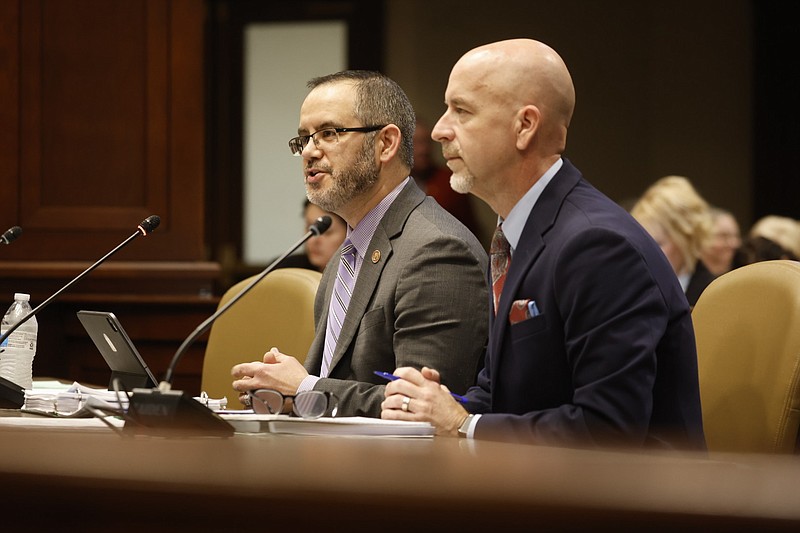The State House Education Committee reconvened Tuesday afternoon to hear testimony from the public on Gov. Sarah Huckabee Sanders’ education overhaul plan, with more than 90 people signed up to speak on the bill.
Cassandra Bone spoke for the legislation, saying public schools generally aren’t equipped to serve students with special needs, including her son.
Bone said her child was able to attend Compass Academy in Conway, a private, non-profit school for children with developmental disabilities, thanks to a scholarship.
“My child who was barely speaking is doing multiplication,” Bone said. “Every child should have the opportunity if they don’t fit the mold.”
Heath Bennett, superintendent of Haskell Harmony Grove School, opposed the bill, questioning how state officials would find the funding to cover its provisions. Bennett said the bill’s voucher program would do little to help students in his district who take more than two-hour bus rides to school.
“It’s very disheartening to listen to how public schools fail all the time,” he said. “If you look at my ACT scores, you may wonder how I’m a superintendent. I was very blessed to have people who believed in me a long time ago. That’s what public schools do.”
— Will Langhorne
11:34 a.m.: State House committee opens discussion of Sanders' education bill
Members of the Arkansas House of Representatives had their first chance to weigh in on Gov. Sarah Huckabee Sanders’ education overhaul plan Tuesday morning before a large crowd at the state Capitol.
Rep. Keith Brooks, sponsor of Senate Bill 294, also known as the LEARNS Act, presented the bill to members of the House Education Committee, calling it “the most aggressive” education package in the state’s history.
The introduction was made before a packed hearing room in the large multi-agency complex known as Big MAC, where some onlookers were asked to leave because the crowd was over capacity.
The bill calls for a phased-in voucher program that will provide 90% of per student state foundation funding for students to attend a private or home school and a $14,000 increase the starting salary for teachers.
Rep. Brian Evans, chair of the House Education Committee, said the committee wouldn't take action on the bill Tuesday, and would instead debate and vote on the bill during a special order of business Wednesday. If approved by the committee, the full House could vote on the bill as early as Thursday, Evans said.
The Senate approved the bill last week, but if approved by the House the legislation would have to move back to the Senate for a concurring vote before heading to the governor for action.
Prior to public testimony, members of the committee asked Brooks and Education Secretary Jacob Olivia about what effect the bill will have on funding, rural school districts. Lawmakers asked how school districts will pay for the proposed $50,000 minimum salary for teachers.
The bill also calls for the repeal of the Teacher Fair Dismissal Act, the state law that requires educators be given written notice before being fired. Brooks said an amendment that he filed Friday would add back in some due protections for teachers to have a hearing before being fired.
Brooks said the repeal of the law would allow school districts to fire poor performing teachers.
Rep. Steven Walker, R-Horseshoe Bend, asked how the school will evaluate “non-testing” teachers such as physical education and music teachers. Olivia said each school district will come up with ways to evaluate “non-testing” school districts.
Rep. Ron McNair, R-Harrison, asked what input the public will have in the rule-making authority it prescribes for the Department of Education, saying it seems that only after the bills will bureaucrats and lawmakers determine how the bill will work.
Brooks said the public will be a part of the rule-making process.
— Neal Earley

